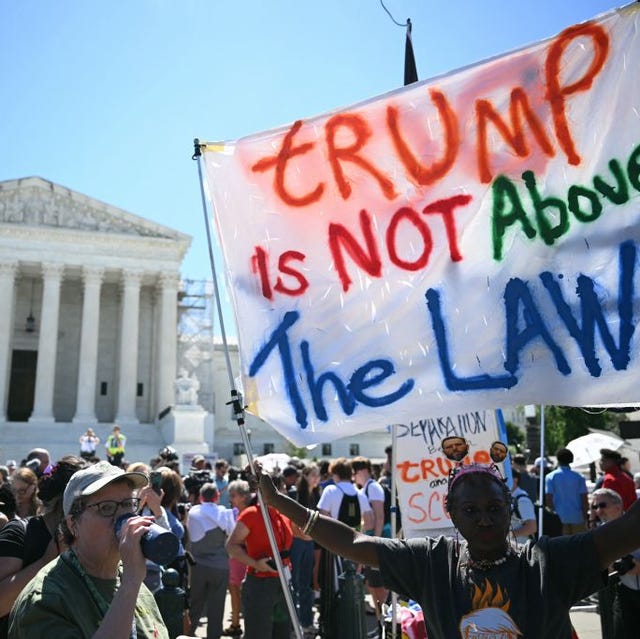Mr. Roberts has made his decision. Now let him enforce it. Goddamn this Supreme Court. It’s got me quoting the apocrypha of that genocidal madman Andrew Jackson. The carefully manufactured conservative majority on the Court, by a 6–3 margin, ruled that presidents—specifically, Donald J. Trump, because if you think this decision will apply to Democratic presidents, please tell me where you buy your mushrooms—have something called “presumptive immunity” for “official acts” they took while in office.
This is specifically designed to hamstring Jack Smith’s prosecutions regarding the insurrection of January 6, 2021, especially in combination with the Court’s earlier decision in Fischer v. U.S. that disallowed the use of an obstruction-of-justice statute under which a number of the rioters had already been charged and/or convicted. On top of that we have Chief Justice John Roberts’s ancillary ruling, which will make a complete hash of the discovery process in any prosecution of the former president*. Roberts wrote:
Testimony or private records of the President or his advisers probing such conduct may not be admitted as evidence at trial.
In the short run, of course, this whole case, on which the Court never should have granted cert in the first place, was directly aimed at delaying the prosecution of the former president* until after the November election and thence, likely, to the Twelfth of Never. It certainly has accomplished that goal. It’s going to take months, if not years, for lower courts to distinguish between “official” and “unnofficial” acts, and every attempt will be appealed, and then appealed again. The former president*’s go-to legal strategy, the one he used to put glaziers and gardeners on the rack until they ran out of money, now has the blessing of the country’s highest court. Jack Smith is just another New Jersey subcontractor who never sees a dime.
However, in the long view of history, this is a pivot point to rival Marbury v. Madison or Dred Scott v. Sandford. The carefully manufactured conservative Supreme Court majority, having earlier arrogated to the judiciary the power to decide specialized questions involving executive agencies, has now decided that questions of a president’s culpability in attempting to ratf*ck a free election are beyond an unambiguous decision. This is a recipe for chaos in government.
Only Justices Sonia Sotomayor and Ketanji Brown Jackson seemed to grasp the epochal importance of the case. Sotomayor put paid to the notion that allowing Smith’s prosecutions to go forward would chill future presidents in the performance of their duties. She wrote:
...because of longstanding interpretations by the Executive Branch, every sitting President has so far believed himself under the threat of criminal liability after his term in office and nevertheless boldly fulfilled the duties of his office. The majority insists that the threat of criminal sanctions is “more likely to distort Presidential decisionmaking than the potential payment of civil damages.” If that is right, then that distortion has been shaping Presidential decision making since the earliest days of the Republic.
She also called out Roberts’s poisonous tinkering with the standards of evidence.
Imagine a President states in an official speech that he intends to stop a political rival from passing legislation that he opposes, no matter what it takes to do so (official act). He then hires a private hitman to murder that political rival (unofficial act). Under the majority’s rule, the murder indictment could include no allegation of the President’s public admission of premeditated intent to support the mens rea of murder. That is a strange result, to say the least. The majority’s extraordinary rule has no basis in law. Consider the First Amendment context. Although the First Amendment prohibits criminalizing most speech, it “does not prohibit the evidentiary use of speech,” including its use “to prove motive or intent.”
And Jackson outlined the fundamental historical and constitutional heresy that the majority had adopted.
It is indisputable that immunity from liability for wrongdoing is the exception rather than the rule in the American criminal justice system. That is entirely unsurprising, for the very idea of immunity stands in tension with foundational principles of our system of Government. It is a core tenet of our democracy that the People are the sovereign, and the Rule of Law is our first and final security. “[F]rom their own experience and their deep reading in history, the Founders knew that Law alone saves a society from being rent by internecine strife or ruled by mere brute power however disguised.” United States v. Mine Workers, 330 U. S. 258, 308 (1947) (Frankfurter, J., concurring in judgment). A corollary to that principle sets the terms for this case: “No man in this country is so high that he is above the law. No officer of the law may set that law at defiance with impunity. All the officers of the government, from the highest to the lowest, are creatures of the law, and are bound to obey it.” United States v. Lee, 106 U. S. 196, 220 (1882). We have long lived with the collective understanding that “[d]ecency, security and liberty alike demand that government officials shall be subjected to the same rules of conduct that are commands to the citizen,” for “[i]n a government of laws, existence of the government will be imperilled if it fails to observe the law scrupulously.”
The carefully manufactured conservative majority on the Supreme Court is done with its work deforming democracy until October. One thing on which we can all agree is that it has been worth every dime that Leonard Leo, and Harlan Crow, and Paul Singer paid for it.
The Nine Wise Souls’ Latest
- The Supreme Court Has Legalized Bribery...So Long as You Do It Right
- The Chevron Deference Ruling Is In. Time to Buy Bottled Water.
- Murthy v. Missouri Could Only Have Happened in the Age of MAGA

Charles P Pierce is the author of four books, most recently Idiot America, and has been a working journalist since 1976.













